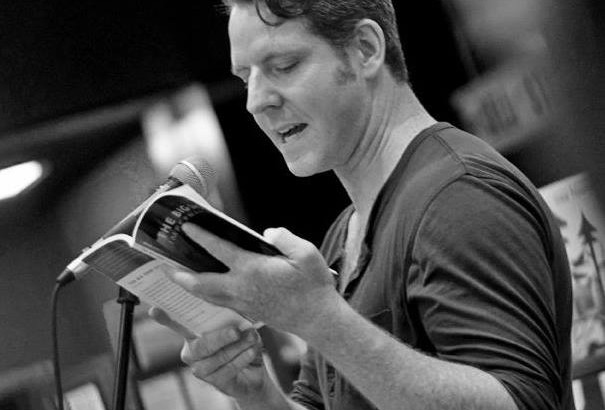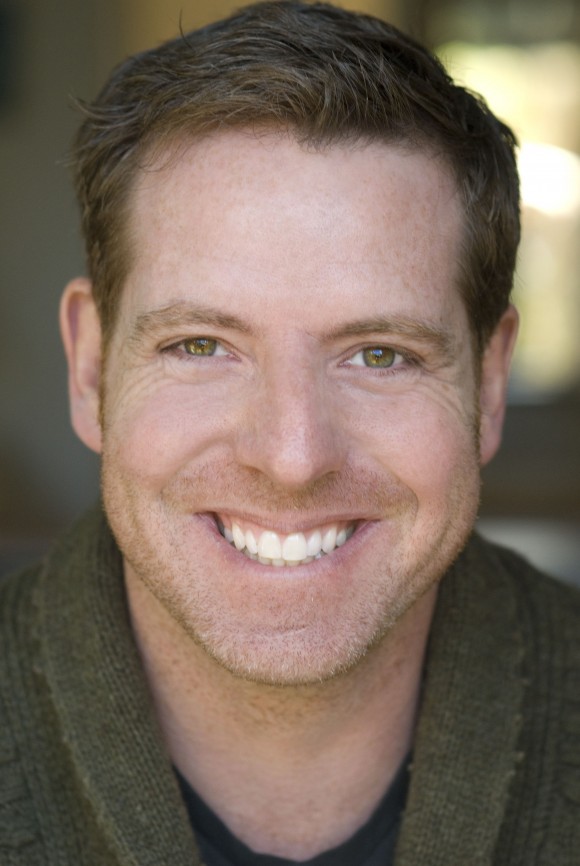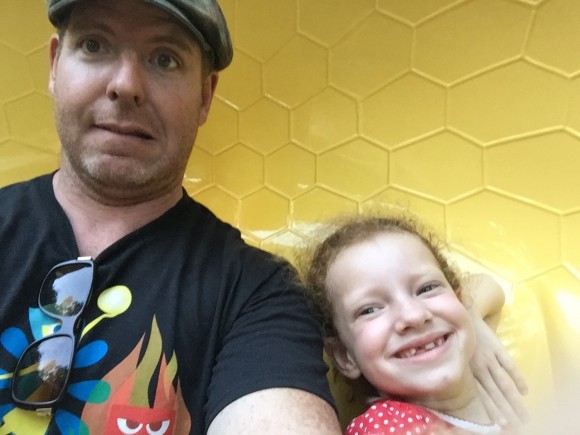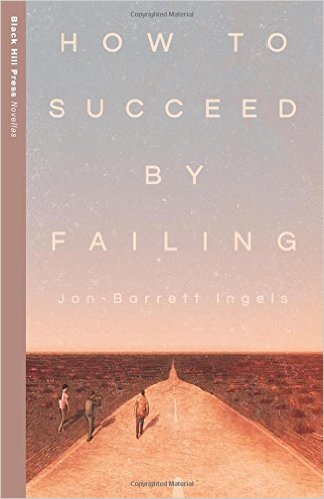
“Chapman Fueled My Artist” How author Jon-Barrett Ingels (Class of '00) finds success in failing
January 14, 2016
President Jim Doti recently wrote an
OC Register article
titled, “With a liberal arts education, anything is possible.”
Jon-Barrett Ingels (Class of ’00)
, actor, father and recently published author, is a shining example of the infinite spectrum of possibilities President Doti refers to.
Jon-Barrett, who studied theatre at Chapman, is the host of the popular podcast, ”
The How The Why
,” and is a Los Angeles-based sommelier. One of his most exceptional talents is how he admirably accepts hardship as part of life’s process instead of resisting or rejecting it. Even more remarkable is Jon-Barrett’s ability to transform his introspection and trial-and-error experiences into compelling and relatable language that not only grips readers, but establishes comfort and encouragement within them by illustrating the universality of failing in raw and personal detail. His new coming-of-age novel,
How to Succeed by Failing
, was published in 2015 by
Black Hill Press
.

Jon-Barrett Ingels (Class of ’00)
Chapman University:
Tell us about your career. What do you do on a day-to-day basis?
Jon-Barrett Ingels:
“Career” is a big word. When you study to be an actor and leap out into the world of film, T.V. and theatre (and commercials), the “career” may quite often seem elusive. I studied, I read, I auditioned, I rehearsed, I did shows for no money and movies for no money, so I was working toward the career, but from an outward perspective (my mother’s perspective), I was working at a restaurant. I feel more empowered with writing. I have more of a tangible thing to show for what I’ve done. “This is my book. Hold it. Feel it. Read it.” It still doesn’t feel like a career. I still work at a restaurant (the best in Los Angeles,
a-hem!
). I studied to be a certified sommelier to help legitimize my restaurant work, but in my free time, I’m writing.
I am working on a novel, creating a T.V. show idea based on a play I wrote and am writing for
Flaunt Magazine
. I have produced and hosted over 100 episodes of
1888
‘s ”
The How The Why
” podcast (a half-hour podcast documenting the creative process and the creative purpose; 1888 was founded by
Kevin Staniec ’01
and serves as a regional catalyst for the preservation, presentation and promotion of cultural heritage and literary arts), where I interview authors, editors, artists and publishers to discuss their process, which has been a thrill and very informative and helped prepare me for the interviews I have done for the magazine. So at this point, my “career” feels fluid. My sweat goes to writing and interviewing. My income is from the restaurant. And I still audition for commercials, which satisfies about 0.5% of my acting itch.
CU:
How were you involved on campus during your time as a Chapman student?
JBI:
I worked for the Admissions Office calling prospective students, and answering questions about the school and the theatre and film programs. I was also a member of Performing Arts Society (PASC) at Chapman.
CU:
What is your favorite Chapman memory? What was your favorite spot on campus as a student?
JBI:
My favorite spot on campus was onstage, either in the Waltmar Theatre or the Blackbox. Most of my favorite memories occurred in those two spaces. I was fortunate to have the opportunity to work on multiple shows helmed by our remarkable faculty and some talented students.
Michael Nehring
directed me in
Grapes of Wrath
and
The Creation
.
Tom Bradac
directed me in
Equus
and
Hamlet
. My most intimate, emotional, fun and challenging experiences happened either in rehearsal or in performance.
CU:
What inspired you to write your first book,
How to Succeed by Failing
?
Right after my daughter was born, her mother and I started writing a blog together called “How to Succeed as a Failure.” We took turns writing about our struggles as actors, as parents, as a couple, as human beings. A couple months into creating the blog, I wrote about an incident that happened at my restaurant job. I had just started playing around with
Twitter
, maybe two years after Twitter launched. I had maybe 25 followers and nothing interesting to say. I started to write about the celebrities who would come to my restaurant. I wrote about how beautiful Susan Sarandon was and a few days later she started following me on Twitter. I didn’t know how it worked. I didn’t know anyone was listening or even cared. I wrote about a bunch of sightings and interactions. An actress came in and I was a huge fan of hers. I took great care of her and at the end of the meal, she had forgotten her wallet. She left with the promise to return. The next day, her manager called with a credit card number for her and paid without paying a tip. I tweeted about it and it got me fired. She’d found the tweet and complained. I wrote about everything in my blog, about how ridiculous it seemed. The whole thing turned into a pretty big story for me: radio interviews, write-ups on (me and the incident) on
Huffington Post
and
PerezHilton.com
. A producer from
TMZ
wanted to help me publish a book. I was working on my fiction novel at the time—I had been working on it for four years. She wanted me to write a book about all my celebrity interactions.
Around the same time, I had befriended a literary agent who liked my writing but couldn’t do anything until I had finished a book. He encouraged me to write a memoir. He said the best way for a new writer to get attention is to write a memoir, like James Frey or Toby Young or Dave Eggers. My blog and my writing style were getting a lot of attention, but I didn’t know what to write about. I didn’t want to just write about celebrities and that stupid Twitter incident. I kept working on my fiction novel.
A couple of years later, after the break-up with my daughter’s mother, I decided to write about everything that had happened to me in L.A. and call it
How to Succeed by Failing
, after our initial blog post. I started with my move to L.A. and 9/11 and the making of my movie (you’ll have to read the book to know what I’m talking about!). At that same exact time, Kevin (Staniec ’01) had launched
Black Hill Press
. He kept on me to write one of my sci-fi stories as a novella. Then he approached me about writing a non-fiction novella about making the movie and losing it all. The stars aligned. I was already working on it, but now it had a purpose. I finished writing the book in about nine months and edited it for few more.
CU:
How to Succeed by Failing
has garnered attention for being a coming-of-age story. How is it a coming-of-age story?
JBI:
Cheryl, my editor, pointed out that my story would be great for students leaving college—the high expectations of what life can be and the slap in the face of the reality, the challenges, the struggle, the true education you receive rapidly after leaving the protection of the walls of a university. I was forced to grow up pretty quickly over the course of the year that my story took place. I had a long way to go after those events. I still have a long way to go. I am still struggling to “come of age.” Kevin pointed out that there weren’t a lot of stories about people from what I call the “In-Between Generation”—in between Generation X and millennials, coming of age after 9/11, and before social media and smart phones.

Jon-Barrett with his daughter, Bowie.
CU:
Was writing your book a cathartic experience? What did you learn about yourself while writing it?
JBI:
I thought I was so wise back then, like I was pulling the veil away from what everyone assumes is reality and seeing the truth. I was ignorant and foolish and reckless, and there was so much freedom to that way of living. I now know that I know nothing, which can make this living thing difficult. There is so much to learn and understand about what it takes to be a happy, healthy, loving, productive, moral, conscientious, confident, successful, humble human being. There is way too much pressure now because time seems way more finite than it did in those days. I was a dreamer back then. Now I have to force myself to keep dreaming. That’s why I write.
CU:
What role did Chapman play in shaping your life pursuits?
JBI:
I started college as a goofy teenager, with braces and an odd sense of style. My first job was at the Disney Store at the Main Place Mall. I was a theatre student and at the bottom of that totem pole. I finished my career at Chapman as what I assumed was a talented actor, liked by the faculty and respected by my peers. I had Panther Pride. I worked in the Admissions Office my sophomore year and called numerous prospective students to sing the praises of Chapman. Two of my close friends ended up at our school because of conversations they had with me.
I took an independent study course on play writing with the late and glorious
Ron Thronson
. He helped me discover my voice and my ability as a storyteller, as did my numerous screenwriting courses. Working one-on-one with Ron and seeing the glow in his eyes when I “got” what he was asking of me was incredible. We also worked in his home instead of a classroom. It was personal and powerful, and I am fortunate to have had that opportunity.
Chapman fueled my artist. I was introduced to great playwrights and fell deeply in love with Shakespeare. I understood the power of listening and reacting, and utilized that with all real-life interactions as well as onstage and camera. I learned about the rhythm of storytelling and the beat structure. I learned about character development and finding the minutia of who a person is and how even the little things define what we are. I left Chapman charged as an artist, but my work ethic lacked. I couldn’t complete things, I would get excited by the next thing and jump in before completing the task at hand. I had one professor and mentor tell me I was immature and needed to grow up in order to do the work required as an actor. I struggled my last two years at Chapman to prove him wrong and win his respect. I learned later it was my own respect I needed to earn. Still working on that.
CU:
Tell me about your role with 1888 and the podcasts.
JBI:
When Black Hill Press had its one-year anniversary event at The Last Bookstore in downtown Los Angeles, Kevin asked if I wanted to be a moderator and ask questions to two different panels about their books and their process of writing. It was a test-run for what would become “The How The Why.” It was awkward and bumpy and totally fun. We talked about what we wanted the podcast to be. I was fascinated by the process of the artist—how they got from point A to point B, from inception to creation to physical product. We were also interested in the motivation of storytellers and artists. Hence, “The How The Why.” I started interviewing artists and authors and editors from the
Black Hill Press Family
(now the 1888 Family). I had to mess around with technology to find the best way to record and sometimes had some horrible mishaps. With fellow alum
Jon Frechette ’02
, I had to record our conversation twice.
Pretty quickly Kevin started setting up interviews with other publishers of indie presses and literary journals and authors outside of Black Hill Press. There was a pressure to have something up every week. Definitely forced me to work differently than I was used to. I liked the deadlines though. As nervous as I was before every conversation, I had a sense of accomplishment when it was edited and posted and being tweeted and re-tweeted. I also liked being able to use social media in my favor and not against me.
In 2014, Black Hill Press partnered with
JukePop
for the
Summer Writing Project
, encouraging people to write and to read, and offering the opportunity to be published to those authors who got the most reads and votes on JukePop’s website. I interviewed the top 12 vote-getters in five or six interviews a day. Our listenership grew aggressively. We brought on an assistant to help me stay organized and help Kevin schedule interviews. She took the job and ran with it. We had bigger named authors, more publishers, bloggers and bookstore owners.
Last summer (2015), Black Hill Press merged with 1888 and “The How The Why” became part of 1888. The Summer Writing Project hosted live events in and around Chapman and the city of Orange. I was fortunate enough to be able to host a bunch of these events and return to my old school and my old town.
CU:
Do you feel Panther Pride when returning to Chapman for “The How The Why” podcasts?
JBI:
It’s amazing how much the university has grown. I get excited seeing the construction of the new performing arts center (
Marybelle and Sebastian P. Musco Center for the Arts
) and walking around the studios of
Dodge College
, and there is a part of me that wishes I had all of that when I was there. It’s also great to see that some things haven’t changed. The older buildings I spent a lot of time in are still there. It’s like an architectural history of the last 50 or 60 years. I meet people on the regular and tell them I went to Chapman and they say, “Ooooh! Chapman!” and look at me like I am something fancy. It’s a good feeling. It was a good school and is becoming a great school. I still have Panther Pride!
Explore and Connect Further:
-
Want to be featured in a blog like this, on social media or in Chapman Magazine? Share your news with us »
-
Want to catch up with alumni friends? Attend our next event »
-
Want to get involved with your alma mater? Volunteer with us or join an alumni group »
-
Who doesn’t like a good deal? Check out your alumni benefits and discounts »
-
Want to receive the monthly alumni e-newsletter and stay connected with Chapman? Make sure we have your current contact info »
Interested being interviewed by Jon-Barrett on “The How The Why” podcast? Send 1888 an email.
You can also connect with him on social media:
Twitter:
@papabarrett
Instagram:
@papabarrett
